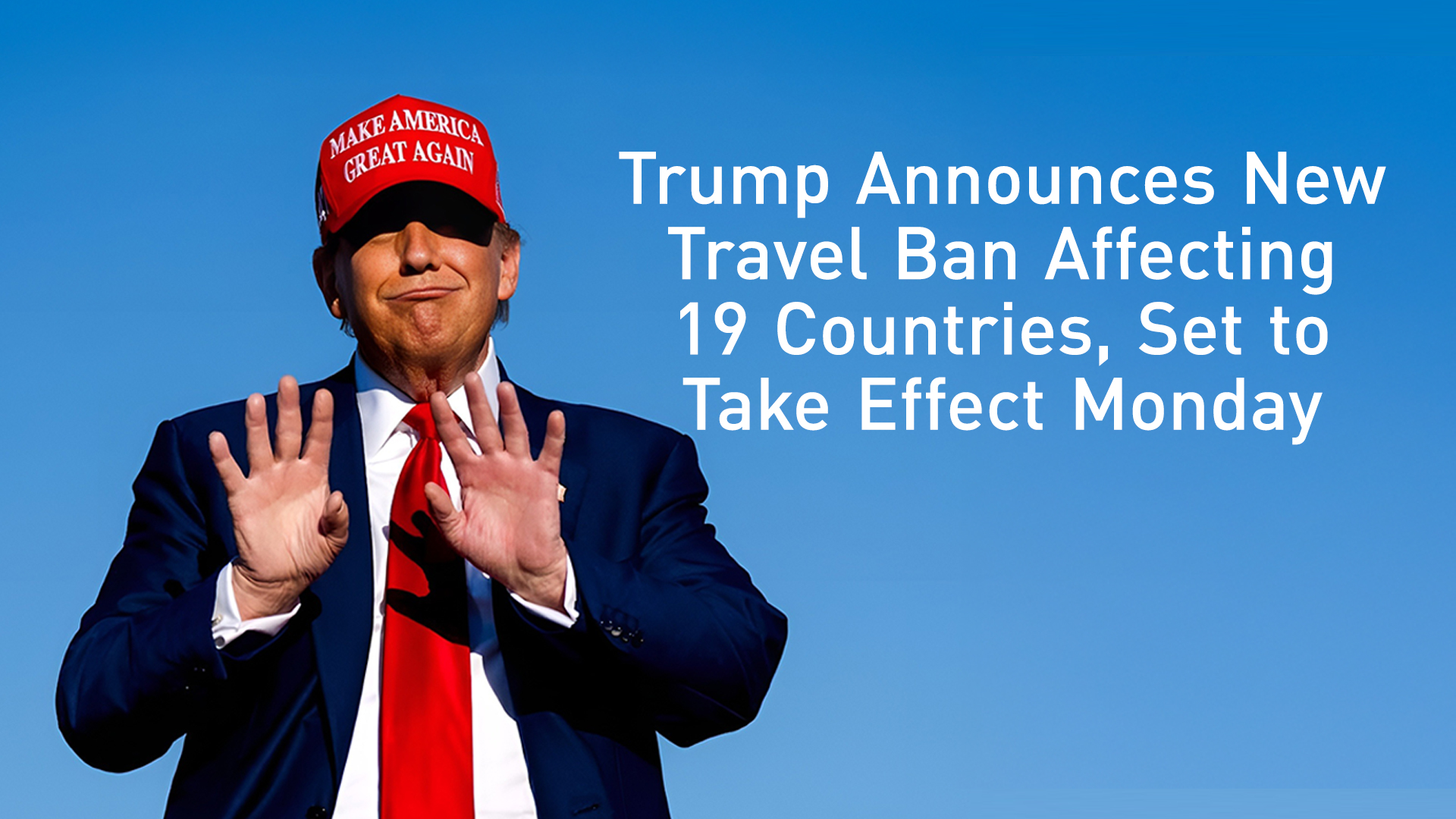Trump Announces New Travel Ban Affecting 19 Countries, Set to Take Effect Monday
The 12 countries now subject to full travel bans include: Afghanistan, Myanmar, Chad, the Republic of Congo, Equatorial Guinea, Eritrea, Haiti, Iran, Libya, Somalia, Sudan, and Yemen. Nations with heightened travel restrictions: Burundi, Cuba, Laos, Sierra Leone, Togo, Turkmenistan, and Venezuela.

ERBIL (Kurdistan24) — President Donald Trump on Wednesday announced a new travel ban targeting 19 countries, reviving a signature policy from his first term. The ban, which includes full travel prohibitions for 12 countries and heightened restrictions for seven others, is scheduled to take effect Monday at 12:01 a.m., according to Associated Press (AP).
The announcement comes as part of an executive order signed earlier this year directing national security agencies to assess global travel risks and visa overstay patterns. Trump said the ban was informed by national security concerns, including inadequate screening procedures and refusal by some governments to repatriate their citizens.
The 12 countries now subject to full travel bans include: Afghanistan, Myanmar, Chad, the Republic of Congo, Equatorial Guinea, Eritrea, Haiti, Iran, Libya, Somalia, Sudan, and Yemen.
An additional seven nations — Burundi, Cuba, Laos, Sierra Leone, Togo, Turkmenistan, and Venezuela — will face heightened travel restrictions rather than outright bans.
In a social media video, President Trump linked the decision to a recent terror attack in Boulder, Colorado. The suspect in that attack, who reportedly overstayed a tourist visa, is from Egypt — a country not included in the list. Trump cited the attack as a “reminder of the threats posed by individuals who enter the country and remain illegally.”
“We don't want them,” Trump said in the video, adding that several countries on the list lacked effective documentation or screening systems.
The administration’s criteria focused on visa overstay rates and the ability of foreign governments to share law enforcement and security information with the U.S. Trump’s decision references findings from the Department of Homeland Security’s annual visa overstay report.
The president emphasized that the move was not targeted at specific religions or regions but instead aimed to protect U.S. borders and national interests. However, critics of the policy point out that a significant number of countries on the list have Muslim-majority populations or face ongoing instability.
The inclusion of Afghanistan has drawn particular attention. While Afghan nationals with Special Immigrant Visas (SIVs) — typically those who assisted U.S. forces — are exempt from the ban, some advocacy groups expressed concern over the broader implications for vulnerable populations.
“To include Afghanistan — a nation whose people stood alongside American service members for 20 years — is a moral disgrace,” Shawn VanDiver, president of AfghanEvac, a nonprofit assisting Afghan refugees, told AP.
Trump’s statement said Afghanistan “lacks a competent or cooperative central authority for issuing passports or civil documents, and it does not have appropriate screening and vetting measures.”
Haiti, which was not on the original 2017 list, has been added due to high rates of illegal entry and visa overstays. Trump’s proclamation noted the absence of centralized law enforcement data in Haiti, citing it as a risk to U.S. national security.
In the Middle East and North Africa, Iran, Libya, Somalia, Sudan, and Yemen remain on the list from Trump’s original executive order in 2017. All are currently affected by civil conflict or strained relations with the United States.
Iran had no immediate comment on the inclusion, though previous U.S. administrations have designated it a state sponsor of terrorism. The travel restrictions apply to most visa applicants, with exceptions for certain humanitarian and special categories.
Refugee resettlement agencies and aid organizations reacted with concern, expressing worry that the new policy may disrupt humanitarian programs and family reunifications.
“This policy is not about national security — it is about sowing division and vilifying communities that are seeking safety and opportunity in the United States,” Abby Maxman, president of Oxfam America, told AP.
The travel ban is a continuation of Trump’s long-standing immigration and border security agenda. His first executive order on the matter, signed in January 2017, initially barred entry from seven Muslim-majority countries. After legal challenges, the policy was revised and ultimately upheld by the Supreme Court in 2018.
The new order builds upon that legal precedent, incorporating additional data and guidance from U.S. security agencies. According to officials, the gradual implementation — with a notice period before enforcement — is intended to minimize disruption at airports and consular offices.
The countries affected vary in their responses. While some have raised objections, others have yet to issue official statements.
President Trump reiterated that the measure is designed to safeguard the American people.
“This is about keeping our country safe and making sure those who enter our nation do so legally, responsibly, and in line with our national interests,” he said.
The new restrictions will go into effect at the start of the coming week. Travelers from the listed countries who already possess valid U.S. visas will not be affected, according to the Department of Homeland Security.